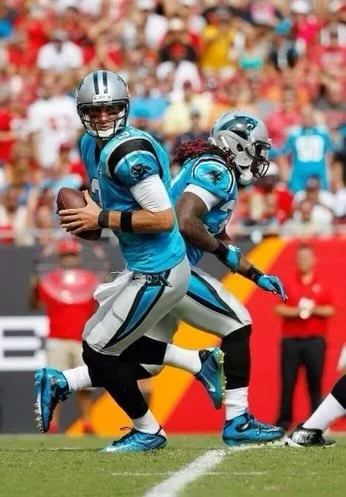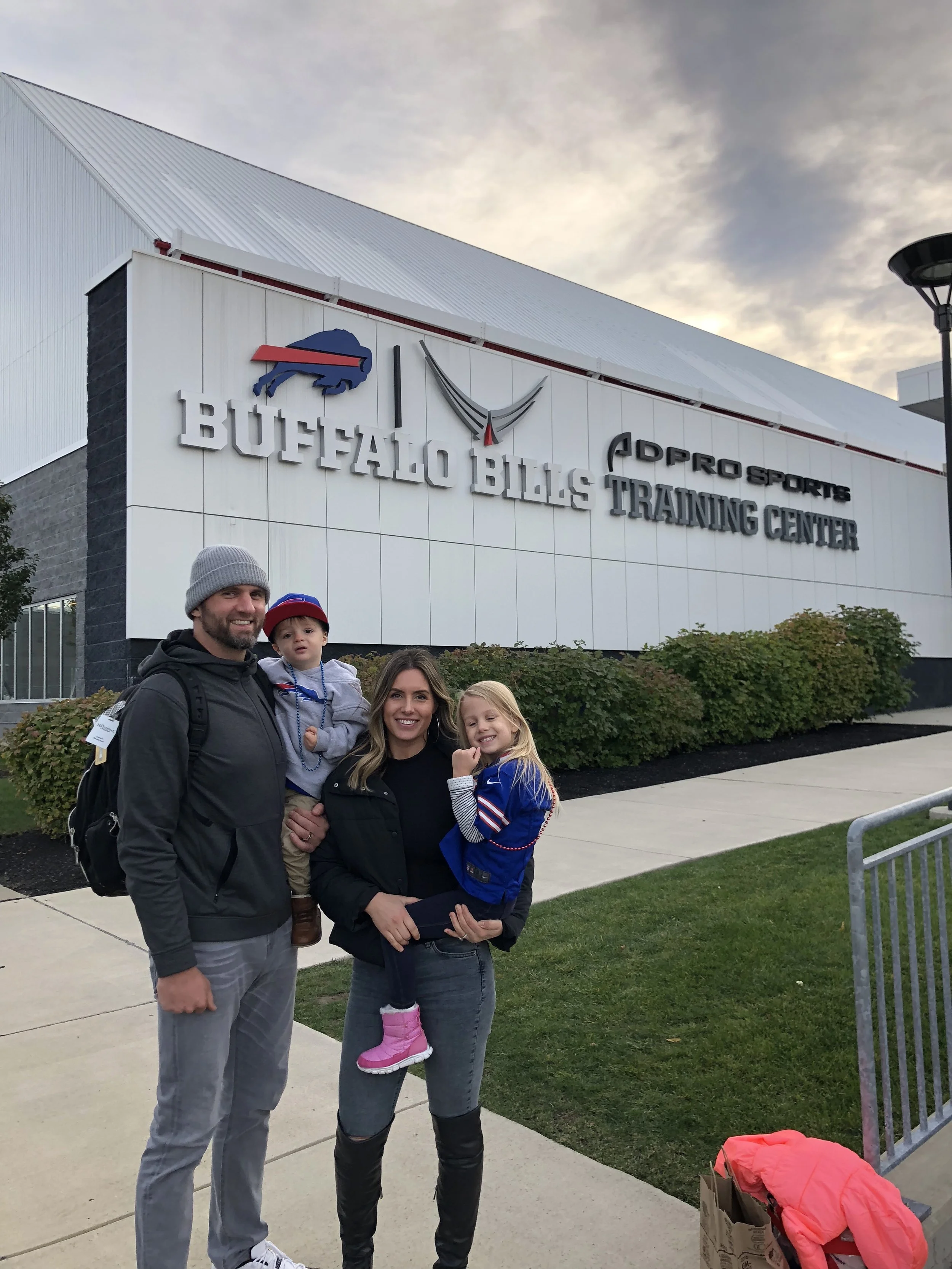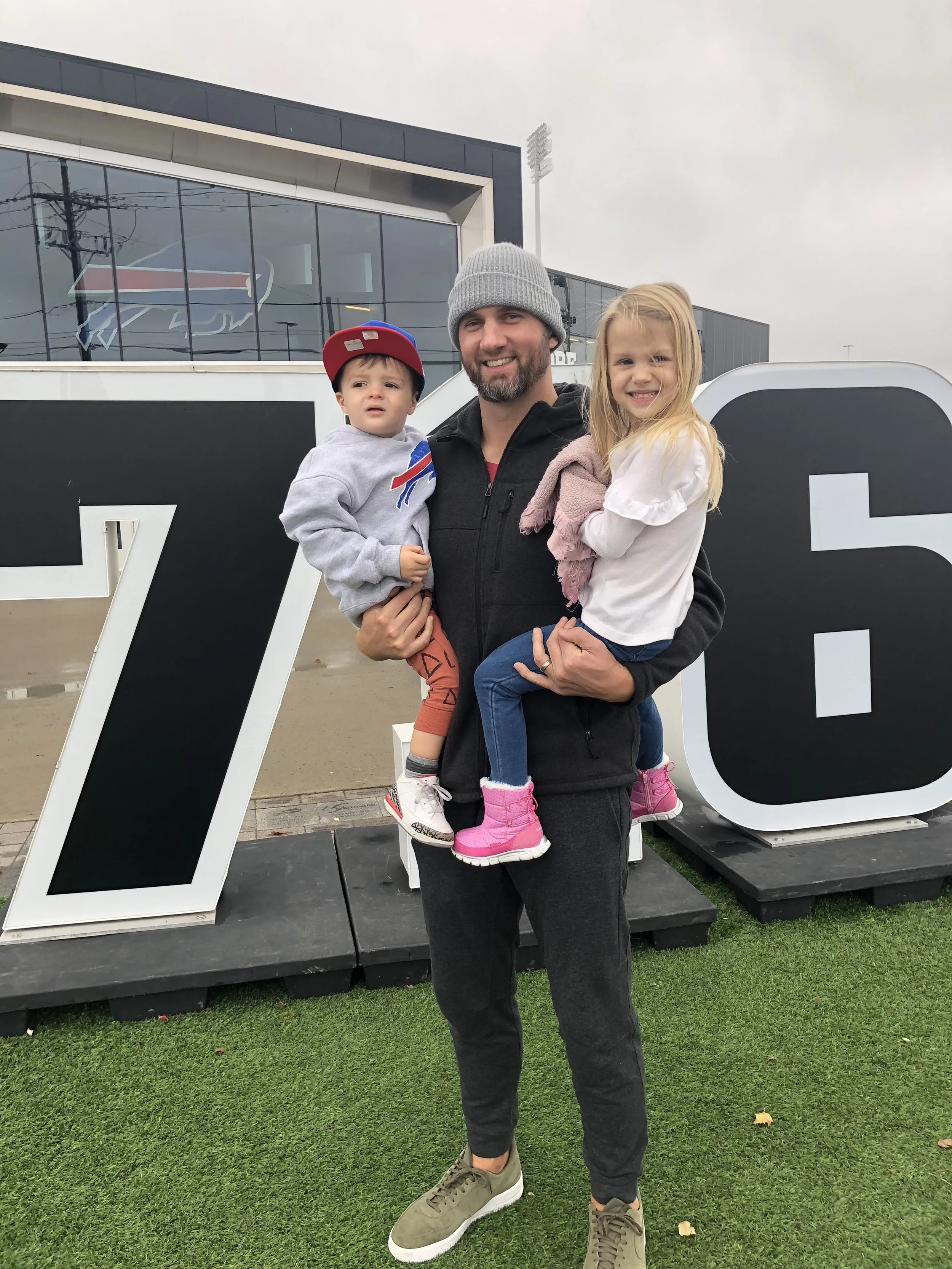Beyond the Xs and Os: Mental Health with former NFL Pro Bowler
by Sara Malcom
Professional athletes are more than just entertainers that we gather together in living rooms, restaurants, and stadiums to cheer on and root against. More than just “points” we’re hoping to win fantasy leagues with.
While athletes give everything they have to their sport (and are expected to by coaches and fans), they are human beings first. At one point or another these athletes face mental and emotional challenges that go beyond the X’s and O’s of their game..
After getting to know Derek Anderson and his family through our daughters playing youth sports together, I asked if he would be willing to have a conversation about his journey with mental health throughout his 14 year career as an NFL quarterback. As you will see in the interview, Derek’s perspective on this now-prominent topic mirrors that of many other elite athletes who have opened up about their struggles. It’s REAL.
Derek is originally from Scappoose, Oregon and played college football at Oregon St.
Derek was drafted by the Baltimore Ravens in the sixth round of the 2005 NFL Draft, he made the Pro Bowl for the Cleveland Browns in 2007, played one season with the Arizona Cardinals in 2010, reached the Super Bowl with the Carolina Panthers in 2016, and retired as a Buffalo Bill in 2019.
He currently resides in Scottsdale, Arizona with his wife Mallory and their three children.
What was your biggest challenge as a professional athlete?
Proving that I belonged, as far as where I was selected- I was a 6th round draft pick. It’s like fighting an uphill battle. Guys that are picked ahead of you have more opportunity. So it was up to me to prove I belonged. It was a battle with myself: I had to prove myself everyday!
Can you expand on how you had to prove yourself?
First it’s just proving you can lead the team and win. Then it’s can you sustain. You really have no room for error from the moment you walk through the door in the morning. I think I handled it the right way for a long time. But there were things I wouldn't have done if I could do it over. I would have let people just accept me the way I was. Being 24 years old starting quarterback of an NFL franchise is a lot..if you don’t have the tools to lean on this can become very difficult mentally.
Tell me about a low point and a high point in your career:
Yes, it started in Baltimore, I was cut in the middle of the season, then I got picked up by the Browns the next day. I had to move from Baltimore to Cleveland in 3 days. It was a big shock. I felt like I was well received and had teammates who liked me in Baltimore, and then suddenly I’m cut, and now I am in cleveland. After that year, I drove to Oregon in my car, and had no plans of coming back. When I got to training camp, I was just done with it, I thought it was so f**** up, and I was thinking “ I’m better than this guy, and I’m not playing. I called my agent and said I can't handle this. Eventually, he talked me off the ledge. So I kept going. The following year, I made the pro bowl, which is the craziest thing that happened to me (on a high note).
I was one of the top quarterbacks in the NFL. So now there is a different expectation of me on all facets of life. My football, my family, the community. I wasn’t ready for the amount of opportunities put in front of me. The amount of times I would say no to things to do other things that were more important. It snowballed out of control. It led to a lot of bad stuff. I got divorced. I went through a hell of a time. My ex wife got half of everything I worked for in my entire life. I had no idea how to deal with it. It was a giant mess that I created. Then going into the next year- I had a hard time- my life – outside of football- was a disaster….Looking back I was dealing with depression and anxiety but at the time, I had no idea, till 9 years later.
Can you expand upon how you were feeling during the low point?
It becomes a very lonely world; I alienated myself from the most.
I am generally a people person but during that time, I didn’t want to be around people. I didn’t want to go to the banquets, the charity events, etc.
There were days I skipped practice in the spring- I would make up some excuse why I couldn’t be there. I was just hiding from everything else. I was struggling at football because of what was going on off the field. No one cares how you feel. Although my offensive coordinator Brian Daboll became someone I could lean on , one day I broke down and went in and told him what was going on. He had gone through similar struggles. He and I had many good conversations. Our friendship is strong because he was there when I was in need of some love.
What was a personal victory (internally or within the game)?
Career wise, when I broke through and became a starting QB in 2007 with the Browns. Personally, it was coming back in 2011 when I resurrected my personal life, career, and started over. I had a second career as a backup- in North Carolina. Prior to that, 3 years was rough. I got to the point where I had to make a decision, and ask myself, “Am I making my best effort to be an NFL player?” During the off season I went to a former trainer, I started over, and decided to work on myself like I hadn't done anything yet. That gave me 8 more years of playing and memories. My trainer recommended for me to do what I had done, to get to where I was. I was gifted enough to be one of the best QBs in the world, by not doing what I should have been doing. I got complacent and didn't put the work in. I started to feel worse about what I was doing. I almost felt like I was stealing.
What caused you to do the work again?
I was in a bad spot and told myself that I can’t be frustrated with where I'm at if I'm not doing the work it takes. I figured that I still have a lot of professional years ahead of me, and decided not to waste it. It became a passion. And then once we had kids, I realized I wanted them to be around it.
Were there any challenges from a mental standpoint with retirement from football?
After retirement the challenge is, what is my purpose? I don’t have to work. But I believe I need to do something to keep my brain active. I’ve talked to a lot of guys, and it’s a struggle for more people than most would even imagine. You are so ingrained in routines. Your routine of daily life is your sport. When you are done you have nothing to hold you to a routine. You can get yourself into a bad spot if you're not cognizant of what you are doing.
The bigger name guys who were very successful-they have all the extra things put on their plate and they consider doing, like commentating, maybe ESPN. The rest of us, we have to find our way.
What was your transition out of the NFL like? Do they prepare you
They pretty much just cut the cord. There are programs while you're playing and they attempt to teach you about life after football. But if you are really entrenched in what you are doing, you're not thinking about what is happening after. When I was in the middle of it, I wasn’t going to sacrifice my job to think about life after football.
What was the best memory during your career?
Teamwise- going to Superbowl 50 in 2015/16 playing for Carolina panthers. Personally, we had Amelia on wednesday night, I was at the hospital , we had a 7:30 game the next night, Cam (Cam Newton) was hurt and I had to play. So I went to the hospital, we had Amelia, then I flew to pittsburg, started in the game, played the first half of pre pre-season game, and started the first week of the season. First kid was born, leaving the hospital and going to play a game. It was just a cool experience.
What was the biggest life lesson from having played at your level?
Live your dream. Whatever you dream of, it is possible. Had this convo with my son Hank, so many people tell you “that's not possible”, or you can't do something. The teacher said, it's “unreal” you can play in nfl, dont think its not real, if you think you want to, you can. I came from a town of 3500 people and no one had gotten a D-1 scholarship let alone succeed in the NFL. To me that mentality doesn't have to be just in sports. If you wanna be something outside of a sport then dream it! My daughter wants to be a Vet,and I say dream it. You may not get there, but it may lead you down another path of something you become passionate about. We dont give kids enough credit for their dreams. No dream is too big! So when a kid says they wanna be something huge, lets not crush their dream.
Many people are afraid to talk about their mental health. Sadly, many people suffer in silence. What would you say to athletes out there who may be having mental health struggles and feel like they are the only one?
It's ok not to be ok. I wish someone had told me the same thing. We are all imperfect humans. We get off track. Sometimes it just takes one person to help you get back on track! Go get help! You will be surprised how freeing it is. Also in young athletes maybe sports is not your calling. There is a reason why you're having those anxieties. It’s ok to go talk to someone and figure it out. There is a lot of pressure in sports and if you aren’t aware things in life can soon be out of control. There may be a kid who is a great athlete, but highly competitive sports may not be for everyone. Not everyone can handle mental pressure the same. Also there are professionals out there that can help with this process and eliminate some of the anxiety so kids and adults can enjoy these games.
Looking back at your professional career would you have handled your mental and emotional health any differently?
I had pressure and anxieties that marinated over time. Looking back I would have done a better job with my mental health. I think I was afraid of what I would have found out if I would have taken a closer look at my mental health, or even the criticism I would get if I opened up about it. Just that stigma. If I was vocal about it, the coach could have thought I wasn't mentally well and that would affect my job.
Is there a stigma with mental health?
Yes but I think it’s changed a ton. It’s hard for some men to be open about their thoughts and feelings. I don’t think most of us are as open as we need to be. It stems from us/men and football players being told this is the way you act and do certain things. It's ok to get help – I understand its hard to open up.. It’s a hard thing to open up to someone you don’t really know.
Young athletes dream of making it to your level. Was the NFL everything one imagines it to be?
Yes and no.
No, from the standpoint, people don’t understand what goes on day to day. So many small things that people wouldn’t understand. A guy comes to work late, does he get fined, does he play? Things also get swept under the rug that never comes out. Sports scene versus the office setting is totally different.
As far as playing, the games, the happy side of the sports – yes, everything you dreamt up in your mind. Going into the stadium and it is full. Nothing I’m gonna be able to do, that will replace that.
Did you ever open up with your teammates when you were struggling with anxiety and depression?
When I was playing, I wouldn’t have. Today I would. Michael Phelps and I are buddies and he’s opened up about his mental health which kinda gave me the freedom to feel ok talking about it as well. I’ve been able to talk to him about what I deal/dealt with, and he obviously can relate. When someone else openly talks about it, you get this understanding you’re not the only one who struggles.
Switching gears, there is already internal pressure an athlete feels when performing. What is your perspective when it comes to external pressures such as parents?
So many people, at all levels including high school, college, professional sports, the pressures are different. I hear parents say they want what’s best for their kid and i understand that, but sometimes the kid isn’t ready to be pushed yet. When I played in high school, I never once thought about what my parents were thinking. And now I see these parents yelling at their kid in the middle of the game. Most competitive kids want and need the positive feedback. There are times to help them grow in the game but while they are playing let them be. Let them enjoy the game with their friends..if the sport isn’t the kids idea and the kid doesn’t have the same motivation as the parent to get better then the parent needs to look in the mirror. It’s hard to do bc we all love our kids and want to see them succeed. I tell my son “don’t do it bc I want you to do it, do it bc you want to do it”. When it is their idea or they now realize that they are gonna need more to compete or keep up that’s where we jump in and encourage.
What is your philosophy with your kids and their sports?
My son plays football, but I want my son to do it because he wants to do it. Not because of what I did. There is enough pressure as we have discussed I don’t need him feeling like he needs to be a pro when he’s 6. Simple stuff like shooting hoops in the backyard- I did it by myself. I didn’t have my parents living under the same roof. I feel obligated to give that to my kids. My daughter isn’t very competitive but has some decent skills she just likes to play with her friends,and that’s ok bc they are all different. I’m aware of where she is and what her potential is, but with her I just have to wait she’s not ready to be pushed yet…and maybe she never will be.
We give our kids an opportunity but if they don’t like it, fine. The moment it becomes about the parent and less about the kid- then it’s a massive problem. You affect their spirit and passion for the game. Once we make it about us, we are causing a lot more harm.
Where did you get your drive from?
It wasn’t a coach. It wasn’t a trophy. It wasn’t my parents. It was an internal drive, and that’s why I was able to do what I did. I had a convo yesterday with a young high school golfer, he’s frustrated with where he is at. It should start with you, not someone else.
Growing up did you have access to extra camps and private lessons?
No not really but my mom did what she could for me. When I got to high school, I took it upon myself to do all the extra things myself, in the morning before school I would do my drills, etc. It wasn’t extra camps and private lessons, no.
Knowing that your parents didn’t pressure you to get to where you got in your professional sports career, what advice do you have to parents' of athletes who are showing signs of success.
Allow it to be the kids’ idea versus the parents' idea. Jim Gallager who wrote “Only one shot” talks about how you have one shot to give your kids the best, don’t screw it up by pressuring them to be more than they want to be. He tells the story about a really good golfer getting burned out, as one of the best players, because his Dad essentially didn’t handle the situation correctly.
——
I appreciate Derek’s willingness to open up about his experiences, as mental health isn’t an easy topic to share about. Thank you Derek for encouraging athletes out there that it’s okay to “not be ok” and always reach out for help when you need it!


